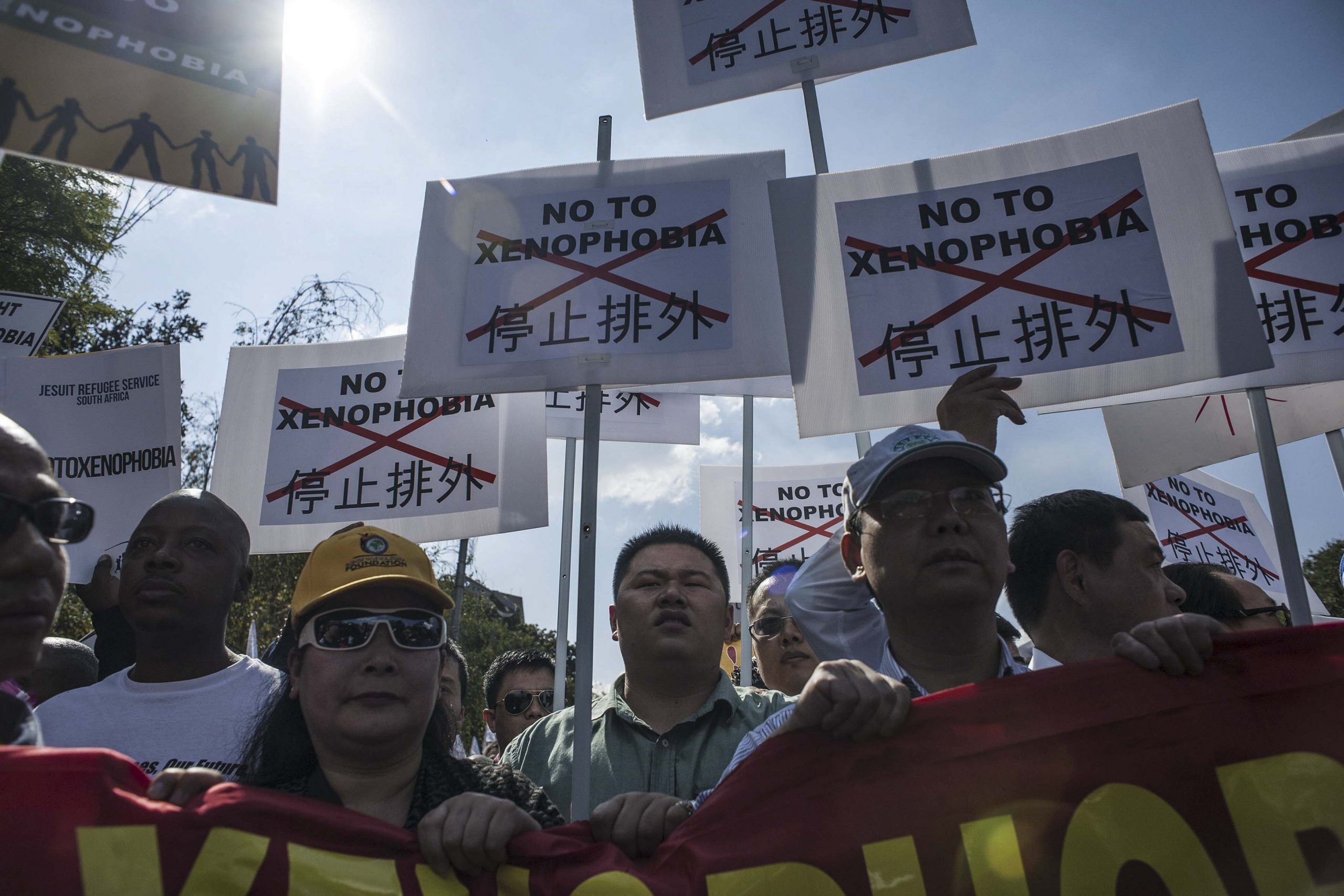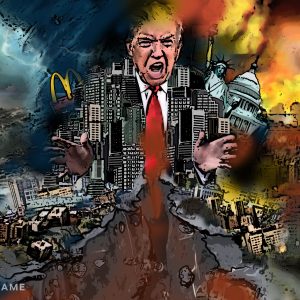Xenophobia marks SA’s ongoing decline
The anti-Chinese posts that flooded social media in response to Xiaomei Havard taking office are loathsome.
Author:
29 January 2021

The Stations of the Cross are a series of images – paintings or sculptures – used by Catholics to mark the key moments between the imposition of a death sentence on Jesus and his body being placed in the tomb. The faithful move from station to station, stopping to reflect and pray at each.
Most often carried out on Good Friday, the ritual focuses attention on the suffering of Jesus in preparation for the celebration of the resurrection, the moment of miraculous transcendence, on Easter Sunday.
In South Africa, our public life has been marked by a series of events over the past quarter of a century, many concretised in visual images. They lay out a journey that moves in the opposite direction, from the transcendence of the social sublime to a descent into horror.
In our current morass it is sometimes difficult to fully recall the scale and depth of the social hope that carried the struggles for liberation. For millions here and around the world, those hopes seemed to be concretised in the ascension of Nelson Mandela to the presidency of the country, a transcendent moment.
There are now multiple lines of descent, each marked out by a set of events and images, from that moment. The repressive violence of the new state was first generally grasped when television viewers witnessed the police murder of Andries Tatane during a protest in Ficksburg in 2011. It was swiftly followed by the Marikana massacre the following year.
Related article:
The sadism carried within the state, a sadism without explicit political purpose, was drawn to public attention with the police murder of Mido Macie, a Mozambican migrant who was dragged behind a police vehicle in Daveyton in 2013 and then met his death in a holding cell. Last year, there was the series of police murders during the first Covid-19 lockdown. The sadism of the state has recently been reinforced with another indelible image – that of a Cabinet minister watching from an armoured police vehicle as the police used a water cannon on impoverished people queueing for disability grants in Cape Town.
The public understanding of the corruption of the state runs from the arms deal, through to the looting in the Jacob Zuma period and then the shock that the initial sense of social solidarity in response to the Covid-19 pandemic had been met with the cynical wholesale theft of resources allocated to ameliorate the crisis.
There is also the initially slowly gathering understanding that the state is not, as was generally understood for a long time, making slow progress towards meeting people’s urgent needs, but has abandoned any kind of real social solidarity with whole groups of people. In early 2014, the death of Michael Komape, a five-year-old boy who drowned in a pit toilet at his school in Chebeng village in Polokwane, drove this reality home with sickening force. And then there was the Life Healthcare Esidimeni outrage, in which 143 psychiatric patients given over to the care of the state ended up dying from neglect, some starved to death.
The inability of the state to consistently find its way through the Manichean logic violently imposed on society by colonialism was first marked out, with a staggering social cost, by the denialism around the aetiology and treatment of HIV in the Thabo Mbeki period. It continued though the Zuma period with the farcical claim that the predatory and repressive state built around the then president was an emancipatory form of opposition to white domination.
Gender-based violence and xenophobia
But the lines of descent from our moment of public transcendence also run through society. The endemic violence against women came to be publicly understood through a set of murders: Anene Booysen in 2013, Karabo Mokoena in 2017, Uyinene Mrwetyana in 2019 and Tshegofatso Pule in 2020.
And then there is xenophobia. It was brought to the attention of the general public with the first major pogrom in May 2008, which left 62 people dead. The images of xenophobic mobs, sometimes with the police standing by, have steadily accumulated since then.
Xenophobia is not unique to South Africa. It is as much a global issue of the moment as the destruction of the environment or the capture of substantial part of infrastructure sustaining the public sphere by the amoral power of the social industries. Right-wing demagogues have come to power in many countries by pandering to and inciting xenophobia. European states deliberately leave the wretched of the sea to die in the Mediterranean. Donald Trump put the children of migrants in cages.
Related article:
When Barack Obama, the son of a Kenyan migrant, won the presidency in the United States in 2008, the white Right – a project fundamentally organised around xenophobia and racism – erupted in paroxysms of fury, which would culminate in the election of Trump. There were similar convulsions when Ahmed Aboutaleb, who was born in Morocco, was appointed as the mayor of Rotterdam in the same year, and again when Sadiq Khan was elected as the mayor of London in 2016.
Radical nationalism in South Africa has always had currents of chauvinism and internationalism. It has not always been easy to completely disentangle the two, but in the ANC the latter came to dominate. Solidarity was given to the people of Palestine, Ireland and Western Sahara, and received from metal workers in Sweden, schoolchildren in Nigeria and the Indian, Chinese, Cuban and Russian states. Pan-Africanism and solidarity between the peoples and states of the Global South were taken as axiomatic points of departure for progressive politics.
But now, in some quarters in the ANC, the state and society xenophobic chauvinism festers with all the crudity and ugliness that we have witnessed elsewhere in the world. In this respect, figures like Herman Mashaba and Aaron Motsoaledi are undeniably Trumpian. The people and organisations that relentlessly incite and organise hate online are as reprehensible as the far-right people and projects that do the same in Europe, North America and Australasia.
An unqualified right
The orgy of anti-Chinese xenophobia, much of it bearing the traits of colonial racism, that rampaged through online platforms on Thursday 28 January was as grotesque and reprehensible as the hatred that has metastasised in other societies. There will be various responses to this.
Some will note that Chinese people walked these lands long before any European did, and that the material remnants of the trade networks that stretched from southern Africa to China still lie in Mapungubwe, Great Zimbabwe and elsewhere. It will also be pointed out that pre-colonial African societies had well-established mechanisms to include people who arrived as strangers.
It will be explained that European colonialism brought Chinese people to Cape Town as slaves, and later to Johannesburg as indentured workers. It will be noted that, as historian Patric Tariq Mellet has shown, many of us – and this is true across all four of Verwoerd’s racial groups – have Chinese people among our ancestors.
Related article:
It will be explained, again, that Chinese people were regarded as “non-white” under apartheid and treated accordingly. Those whose nationalist fervour exceeds their knowledge of the history of anti-colonialism will be informed that it was a fundamentally planetary and cosmopolitan project.
This is all true.
It is important to point all this out to the ignorant drunk on the colonial myth of a pre-colonial Africa separate from the wider world. It is also important to point all this out to people who have hallucinated a myth of an Africa colonised in isolation from a global project that, from 1492, entangled the people of the planet in what is now a permanent cosmopolitanism. Captured Africans were enslaved and taken to the Caribbean and the Americas. Criminalised Europeans were taken to Australia. Impoverished Asians were taken to the Caribbean, Fiji, the Indian Ocean islands and Africa as indentured workers. None of this can be undone.
But it is not necessary to state any of these facts to oppose an orgy of xenophobia and racism, much of it dripping with the kind of hatred and contempt for a person imagined as fundamentally alien that, all over the world, excites the stupid, the small-minded and the ugly.
Related article:
Xiaomei Havard is a South African citizen. Like everyone else who lives here, she is now from here. She has an unqualified right to join a political party and accept office in that party. Like anyone else who accepts political office, her experience, capacities and conduct should be subject to rigorous public scrutiny. This is all that needs to be said.
When people who count themselves as activists, progressives or radicals join an online frenzy centred on the idea that it is outrageous for a person of Chinese descent to be in Parliament solely because they are of Chinese descent, another moment in our descent – this time captured by the image of a sickening hashtag – has been marked out.
These are days that call us to hold to principle without equivocation.




